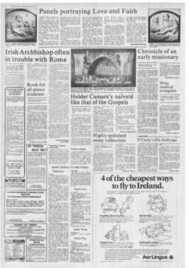Page 4, 18th February 1977
Page 4

Report an error
Noticed an error on this page?If you've noticed an error in this article please click here to report it.
Tags
Share
Related articles
Rhodesia Missions Still Unarmed
The Truth In Rhodesia
Seven Missionaries Killed In Rhodesia
The Following First-hand Account Of The Jesuit Mission In...
We Didn't Kill Priests Says Front
Missionaries' deaths blamed on Smith regime
We hardly ever hear the voice of African people actually living in Rhodesia, but last week the sermon preached at the funeral of the seven missionaries shot at Musami Mission was broadcast on British television.
Fr Isidore Chikore, who preached the sermon, was the first African priest ordained in Rhodesia and is the spiritual director at the National Seminary.
He said that tragic events like these were bound to occur as long as the people of Zimbabwe were denied the most basic human rights, and laid the ultimate blame of the missionaries' deaths on the Smith regime.
In the British media the use of the word "terrorist" usually meant a black man with a gun,
but a check on the number of people killed recently raised the question of who was trying to get his own way through the power of the gun.
In the week of the Musami killings, the Rhodesian forces claimed credit for killing 48 people. Most of these they described as curfew breakers or people "mingling with guerrillas".
The Rhodesian Defence Minister P. K. van der Byl, said on TV in Rhodesia last year "the more of these people killed the better". Since June last year the number of people of this type killed each month has been about 100.
For an African, the curfew means that stepping out of doors between dusk and dawn makes him liable to be shot dead without warning. Since his bedroom is usually a separate
but it means he can't leave his bedroom.
In some areas the Rhodesian soldiers have orders to take no prisoners, except for interrogation. Interrogation is begun by shooting off the prisoner's kneecaps to prevent him escaping.
On the other hand the guerrillas know that they cannot hope to succeed unless they win the hearts of the people. Gratuitous brutality will get them nowhere.
They arc careful to warn locals about driving on mined roads, and the hospitality they receive from locals is a witness to the goodwill they have generated. Last year more than 20,000 youngsters crossed the border to join the guerrilla army. This is something of an embarrassment to the guerrillas, who are finding it difficult to set up enough schools for those too young to fight.
It is true that the guerrillas have shot informers, but this has been done only after several warnings: the ordinary people accept this.
Still, we do ask who pulled the trigger at Musami. I don't know the answer. The Patriotic Front, which has denied responsibility has nothing to gain from such an incident.
It would serve Smith's purposes far better to put the blame on the guerrillas and frighten troublesome clerics into keeping quiet and asking for police protection.
It is possible that the mission
had made enemies or that someone there was informing. We will probably never know the whole truth, but one very interesting fact has escaped the notice of the British Press.
When the Rhodesian police captured a man who they said, had admitted killing Bishop Schmitt and the other missionaries in December, they let him escape from a lightly guarded police station. Such men are usually heavily guarded and do not escape, so the story is very suspicious.
We will probably never know the full truth of what has happened in Rhodesia during the past few months, but it is important to remember that those whom we mourn are only a few of the many victims of a violent situation.
It is the intransigence of the white Rhodesians that has created this situation.
blog comments powered by Disqus









